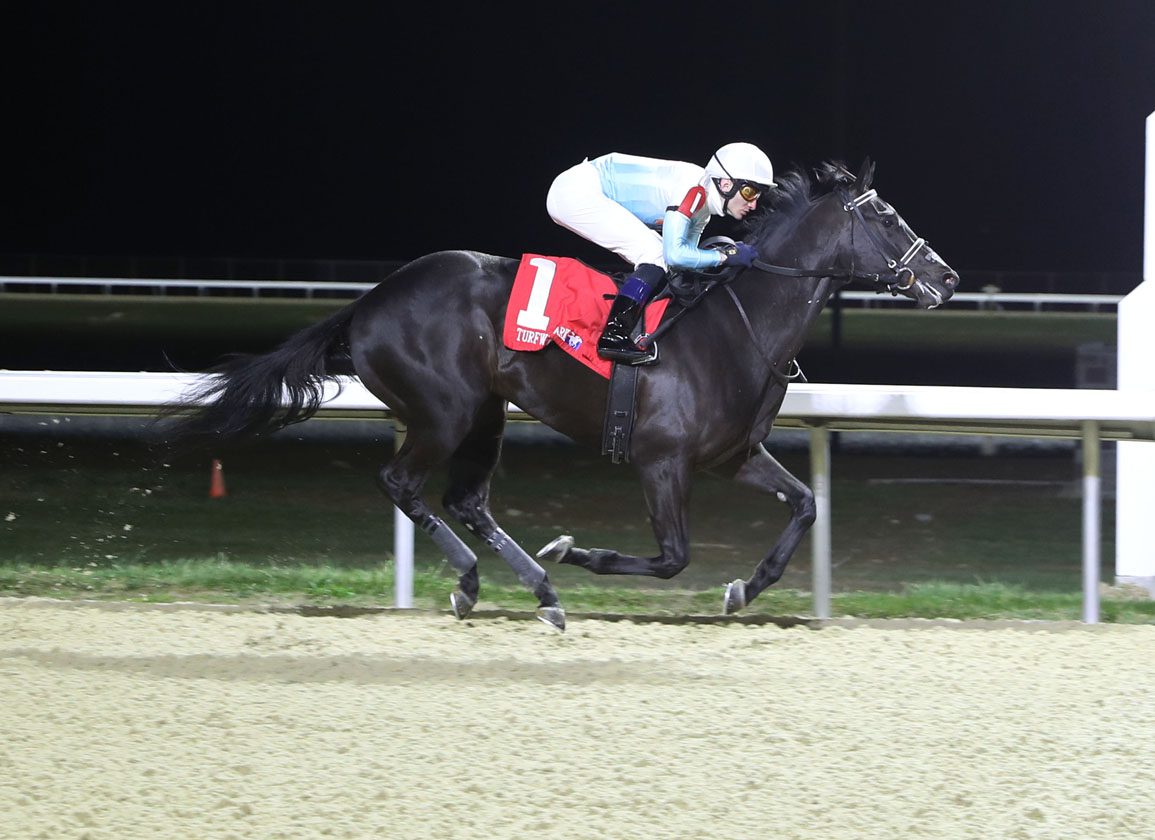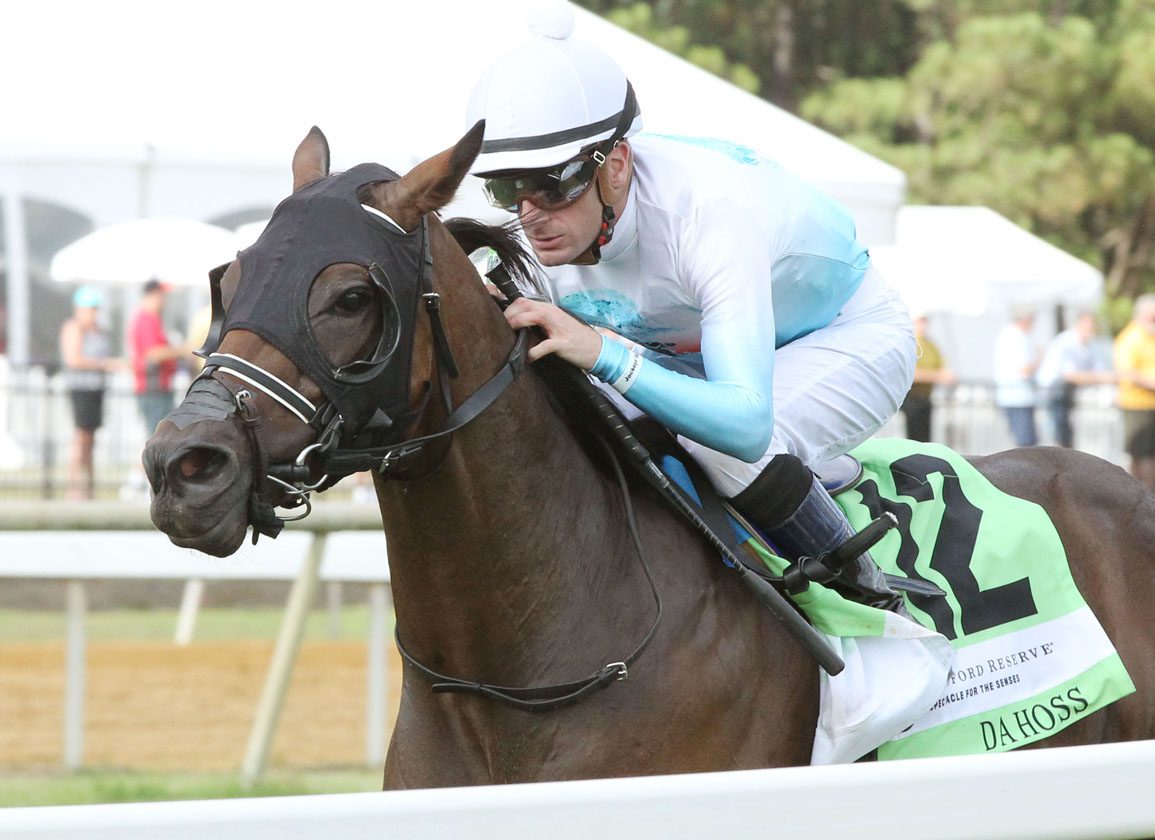Last year, we conducted a popular Q and A series called 'Smaller But Still Super,' where we featured veteran trainers who have built a competitive racing stable with relatively small numbers (click here to view the archive). This year, we will highlight trainers who have already cut their teeth as novice trainers, but now have a few years of experience under their belt and are looking to make a name for themselves as they grow their stable. We'll talk about the challenges that come with hanging out your single, advice for trainers setting out on their own, how the incoming class of young trainers differs from previous generations and more.
A native of Lexington, Kentucky, Jordan Blair grew up immersed in the Thoroughbred industry of the Bluegrass, but he didn't find his way onto the racetrack until later on his career. He spent his high school and college days working for various farms and sales consignments, from Pin Oak Stud and Dromoland Farm to Taylor Made. After graduating from the University of Kentucky, he went on to earn a Master's Degree in Agribusiness Management. Soon after, he found his true passion on the racetrack and served as an assistant for eight years, learning from the likes of Kenny McPeek and Mike Maker, before taking out his trainer's license in 2013.
Based in Louisville, Blair has steadily built his operation since and now stables around 20 horses. Last year he reached 100 career wins and celebrated his best year yet in earnings.
Blair normally heads south for the winter, but decided to race out of Turfway this year. It proved to be a lucrative decision, as his stable already has six wins on the year and is winning at a 22% clip.
What was the biggest challenge in those first few years as you were getting started?
A big part of it is financial, just paying the bills and making sure your owners are paying the bills. It's about making sure you have good-quality horses and owners in your barn. I've found that a lot of people will try to take advantage of you early on, wanting to do deals. We went through those people very quickly because I learned those lessons the hard way.
When I was first starting I didn't care if a horse was bred in Kalamazoo, I was just trying to fill stalls. Honestly, we were running horses in spots that they didn't belong in because I didn't want to lose them. Now if I have a horse in the wrong spot, I can promise you that it's not my idea. Now we just want to win and I'm not worried if we lose a horse in the claim box.

Debut winner Midnight Rising runs in Saturday's Rushaway S. At Turfway Park | Coady
What do you think makes your stable or your training style unique?
Training is not rocket science. It's paying attention to details and focusing on the little things. When I was younger, I had to learn about work ethic. One of my old bosses from Pin Oak Stud Clifford Barry told me, as he was kicking my tail end every day, focus on the little things and the big things will take care of themselves. I've kind of lived by that as a trainer as I've grown my business.
As I've evolved as a trainer and rules have changed and the veterinary inspections have gotten more rigorous, I've made a focus on the soundness of the horse. Not that I didn't pay attention to that before, but it's more important now than it has ever been. We're constantly going over the horse and I'm hyper-focused on the details and the health of the horse.
This is your first winter at Turfway. What went into that decision to stay in Kentucky?
Tampa Bay Downs was the first place I went and I went there every winter. I knew it was a good surface, a great turf course and a circuit where I knew I could win races down there. Most owners are just looking at numbers, so I wanted to keep our numbers decent. But then I had a family and leaving them every year was awful.
I really hadn't had the opportunity to stay until this year. The first year that Turfway started to get better and purses went up a bit, my owners were not on board yet. Last year I really wanted to stay but I didn't get any stalls at Turfway. This year the facility we stay at all year, Trackside, stayed open. So it was an easy decision.
It has gone really well. We've won our share of races, purses are significantly better, and I've been able to see my kids every day. We had a relatively mild winter with only a few days of jogging in the shedrow, but overall it's been a delight and we've saved a ton of money not having to ship a stable south.
Is a trainer's success defined more by the quality of the horses they receive or their abilities as a trainer?
If you're a college basketball coach, you can be Rick Pitino and be one of the best coaches in history, but you can't win a national championship at Iona. If you're talking about the top of the game, you need the right type of quality of horses to get you there. You can't make a horse faster than their potential unless you're doing something illegal. You can't get to the top without the right horse.
Who is your favorite horse that you've trained?
I have one in the barn now that could be something for Surfside Stables. Midnight Rising (Mendelssohn) broke his maiden at Turfway impressively. He runs in a stake at Turfway this weekend. His last breeze was just amazing. He acts like he's very special.
One of my first horses was a Donegal horse named Oatfield (Candy Ride {Arg}). I thought he was awesome, but he bowed a tenon at the beginning of his 4-year-old year. At the time he was the best horse I had ever had.

Oceanic gets his first stakes win in the 2022 Woodford Reserve Da Hoss S. | Coady
Do you have a horse that you had to overcome obstacles with that you are most proud of getting to the starting gate?
Oceanic (Constitution) is my first and only stakes winner and he is pretty special. He has been in our care since he was two, but he didn't win a stake until he was five. He had immense potential early on, but he was a thumper. Thumping is an electrolyte imbalance that causes a flutter in their diaphragm when they run. It's almost like a hiccup, so it makes running as fast as you can impossible. Figuring that out was a long process and it was frustrating, but his owners and I were patient and kept on with it. He's that horse that overcame obstacles and we had the patience and wherewithal to figure it out with the help of a lot of people along the way.
If one change was made to racing that would make your life as a trainer easier, what would it be?
I'm not a big fan of HISA, and it's not because it's a governing body. I don't think what they're doing is improving the game because it's putting unnecessary pressure on people who follow the rules. If they really wanted to clean it up, all this money should be put into investigations like those that were done with the Navarro and Servis case. That's what's going to clean up the game. It's not catching guys with a small overage on bute or something like that, it's getting rid of this off-market clenbuterol and all this other crap that people are using to cheat and win. We know who they are now and we knew who they were before they proved it with Servis and Navarro. If I was a governing body of horseracing, I would put my resources into these investigations.
I thought HISA was supposed to make uniform rules across the board, but it does not. Tracks or states can make their own rules as long as they are more stringent than HISA. I thought HISA would make all that the same and it hasn't, which is really frustrating.
If you could spend one afternoon at the track enjoying the day (i.e. not working), which track would you be at and where would we find you hanging out?
It's gotta be Keeneland. It's close between Keeneland and Saratoga. Back in college, we were in row 20 tailgating. They didn't have tailgating on the Hill back then. We would be there at nine in the morning and tailgate until the second or third race. Now I don't think I have a spot because I don't really go unless I'm running.
If you aren't at the racetrack, what can you be found doing?
I would be either with my family or working out. My kids are into sports, gymnastics and horseback riding. My hobby is exercise, so I'd be at the gym or the gym in my garage.

The post Earning Their Stripes: Jordan Blair appeared first on TDN | Thoroughbred Daily News | Horse Racing News, Results and Video | Thoroughbred Breeding and Auctions.
Source of original post


